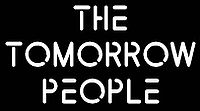|
The original series was produced by Thames Television for Britain's ITV network. The Tomorrow People operate out of a secret laboratory, The lab, built in an abandoned London Underground station. The lab was revamped at the beginning of series 6. The team watch for new Tomorrow People "breaking out" to help them through the process and sometimes deal with attention from extraterrestrial species. They deal with the "Galactic Federation" which oversees the welfare of telepathic species throughout the galaxy. In addition to their psychic powers, they also use advanced technology such as the biological computer TIM, which is capable of original thought and can augment their psychic powers. TIM also helps the Tomorrow People to teleport long distances, although they must be wearing a device installed into a belt or bracelet for this to work. Teleportation is called jaunting in the programme, similar to the term jaunte used in the novel The Stars My Destination.
In the original series the Tomorrow People are also referred to by the term Homo superior. This term appears in David Bowie's song Oh! You Pretty Things: "Let me make it plain. You gotta make way for the Homo Superior." This term came up as part of a conversation between Roger Price and David Bowie at a meeting at Granada studios in Manchester. Price was directing a programme in which Bowie was appearing. Price had been working on a script for his Tomorrow People project and during a conversation with Bowie, the term Homo superior came up. Bowie liked the term and soon afterwards wrote it into his song, pre-dating the series itself which was eventually produced as a TV series by Thames TV in 1973. Price has sometimes been quoted as saying that that the lyrics to this song were inspired by the series, not the other way around. This, however, is impossible, as the album containing the song (Hunky Dory) was released two years before The Tomorrow People began. The term "Homo Superior" has also been used earlier, for instance by the character Magneto in the American X-Men comic book. The earliest known use of "homo superior" as a description of a superhuman was decades prior, in British author Olaf Stapledon's novel Odd John.
Alistair McGown of Screen Online cites The Mind in Chains by Dr Christopher Evans as a primary source. He also suggests a similarity between the Tomorrow People and the children's fantasy fiction of Enid Blyton.
While they reveal their existence to some, the Tomorrow People generally operate in secrecy for fear that normal people (whom they term "Saps", a pejorative abbreviation for Homo sapiens) will either fear or victimise them because of their special powers or try to exploit them for military purposes. In order to defend themselves they must use non-lethal weaponry such as "stun guns" or martial arts throws due to their inability to cause harm, referred to as the "prime barrier".
Even for the time, the special effects of the original show were considered sub-par and camp, largely attributable to the show's small budget. For example, the series initially suffered from the somewhat primitive yellow-screen chroma key effects of the time, although in later episodes the special effect for jaunting became very convincing (In series 1, they were enshrouded by a shower of yellow lights when they teleported; beginning in series 2, the effect was changed, so that they could just fade out, and then fade in again somewhere else). In an interview Price said that the producer of Doctor Who actually telephoned him, and asked how he managed to make people jaunt while others moved in the shot.
|

